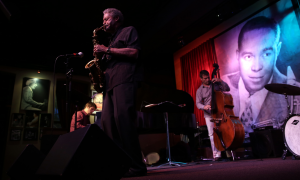Home » Jazz Articles » Jazz Bastard » October 2017: Grover Washington Jr, Bud Powell and Ferit Odman
October 2017: Grover Washington Jr, Bud Powell and Ferit Odman

Back on episode 63, we took a hard look at "smooth" jazz and emerged wiser, if scarred, from the experience. Episode 125 (October 4, 2017) explores a fountainhead of the genre that still boasts substantial jazz content: George Benson's Breezin'. We discuss how Benson's fleet technique as a guitarist made him an unlikely populist hero, and how his limited but pleasant singing voice unlocked a wide popular audience. The rest of the 'cast tracks a tributary to the "smooth" jazz torrent—soul jazz. Hank Crawford's Don't You Worry 'Bout a Thing, Grover Washington, Jr.'s Soul Box, and David Sanborn's Voyeur all come up for discussion, as we contrast each altoist's distinctive sound as well as the production styles of Bob James and Marcus Miller. Does Bob James' work on Kudu Records lead inexorably to the disco era? Jury's out on that one, but tune in to get Mike's take. We also briefly discuss the lineage of the soul saxophone sound (Lou Donaldson says hello). On the pop matters segment, Mike talks briefly about the Feelies' debut Crazy Rhythms, while I touch on Nick Cave's Skeleton Tree (as a follow-up to Mike's discussion on podcast 124), Matthew Sweet's Tomorrow Forever and Procol Harum's A Salty Dog.
Listen to episode 125
Episode 126 (live October 18, 2017) goes further back in time when, at Mike's suggestion, we look at pianists active in the 1940's. The episode opens with a discussion of Mary Lou William's early career, focusing on her 1945 Zodiac Suite but pointing neophytes interested in her early work to mid-fifties recordings on Chronological Classics and her A Keyboard History. Next, we look at Bud Powell's earliest recordings for the Verve label, which are both technically awesome and a little nerve-wracking. To complete the trifecta, disc one of a Blue Note release compiling Tadd Dameron and Fats Navarro recordings gets a hard look in, with Mike trying to get me to explain what characterizes a brilliant jazz arranger (turns out that I'm not sure). Finally, for a change of pace and decade, we discuss Ferit Odman's 2015 release Dameronia With Strings . It's a modern all-analogue recording and a tonic for shattered nerves. Pop albums looked at glancingly include works by the Black Keys, Leonard Cohen, Nikki Yanofsky (who insures that Canada remains a leading exporter of jazz vocalists), and Aimee Mann, so the whole spectrum from horny, to melancholy, to innocent, to melancholy again gets covered.
Listen to episode 126
Thanks for listening and see you next month!
Tags
Jazz Bastard
Patrick Burnette
Grover Washington Jr.
Bud Powell
Ferit Odman
Podcast
george benson
David Sanborn
Bob James
Mary Lou Williams
Zodiac Suite
Tadd Dameron
Fats Navarro
PREVIOUS / NEXT
Support All About Jazz
 All About Jazz has been a pillar of jazz since 1995, championing it as an art form and, more importantly, supporting the musicians who make it. Our enduring commitment has made "AAJ" one of the most culturally important websites of its kind, read by hundreds of thousands of fans, musicians and industry figures every month.
All About Jazz has been a pillar of jazz since 1995, championing it as an art form and, more importantly, supporting the musicians who make it. Our enduring commitment has made "AAJ" one of the most culturally important websites of its kind, read by hundreds of thousands of fans, musicians and industry figures every month.























